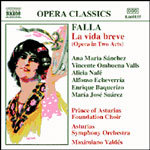
La Vida breve (complete opera)
 $25.00
Out of Stock
$25.00
Out of Stock6+ weeks add to cart
MANUEL DE FALLA
La Vida breve (complete opera)
Enrique Baquerizo (tenor) / Manuel Cid (tenor) / Alfonso Echeverria (bass) / Alicia Nafe (mezzo-soprano) / Asturias Symphony / Maximiano Valdes
[ Naxos Opera Classics / CD ]
Release Date: Wednesday 2 June 2004
This item is currently out of stock. It may take 6 or more weeks to obtain from when you place your order as this is a specialist product.
Manuel de Falla is universally acknowledged as the central personality of twentieth-century Spanish musical culture. Born in 1876 in Cádiz, Andalusia, he aspired as a young boy to be a writer but by the mid-1890s had decided to concentrate on music.
To further his ambition of becoming a composer he studied in Madrid, his first works being for the piano. Between 1900 and 1904, seeking to earn a living, he wrote six zarzuelas, the light operas popular in Spain. These were financially unrewarding but in Madrid, Falla came under what he described as the 'complex revitalizing influence' of Felipe Pedrell (1841-1922), the great Catalan musicologist and composer. Pedrell inspired his students (among them Albéniz and Granados), to appreciate the historic traditions of Spanish music, with emphasis on folk elements and relevance to contemporary composition.
In 1905 Falla won first prize with La vida breve (Life is Short) in a competition for Spanish opera awarded by the Royal Academy of Fine Arts of San Fernando, but, as no public performance for the work was offered in Spain, he decided to seek better prospects in Paris. In the bracing cultural atmosphere of the French capital, he became friends with various leading composers of the era, such as Albéniz, Debussy, Dukas, Ravel and Stravinsky. As well as receiving performances of several of his piano works and songs, La vida breve was eventually produced at the Casino Municipal, Nice, in 1913, and repeated at the Opéra-Comique in Paris the following year.
After returning to Spain at the outbreak of World War I, Falla's reputation was rapidly in the ascendant in his native land. Performances of La vida breve (14th November 1914, at the Teatro de la Zarzuela, Madrid), and Siete canciones populares españolas (Seven Spanish Folksongs), a few weeks later, confirmed his status among critics and public as the foremost contemporary Spanish composer. In April 1915, at the Teatro Lara in Madrid, came the première of one of his finest masterpieces, the ballet with songs, El amor brujo (Love the Magician). This was followed by the first performance (1916) of Noches en los jardines de España (Nights in the Gardens of Spain), for piano and orchestra, and the illustrious success of another ballet, El sombrero de tres picos (The Three-Cornered Hat), first given in Madrid in 1917.
In 1920 Falla moved to Granada. Here, with the poet, Federico García Lorca, he organized the renowned Cante jondo flamenco competition of 1922, an attempt, regrettably not repeated, to conserve and revive the ancient art of Andalusian song. In Granada, Falla composed El retablo de maese Pedro (Master Peter's Puppet Show, an adaptation of various episodes from Cervantes's Don Quixote), Psyché, the Concerto for harpsichord or pianoforte, Soneto a Córdoba (for voice and harp) and other works. His last completed composition was a set of four Homenajes (Homages) for orchestra, first performed in Buenos Aires in 1939, conducted by Falla himself. From 1927 until the end of his life, Falla worked on the cantata, Atlántida, a massively ambitious undertaking left unfinished but eventually concluded by his eminent disciple, Ernesto Halffter (1905-1989), for its belated première in 1961.
Following the Spanish Civil War (1936-1939), and devastated by the tragic murder of his friend Lorca, Falla left Spain in 1939 for Argentina. He died there in 1946 a few days before his seventieth birthday. He had suffered from severe ill health for many years, and this certainly limited his output. Yet though not a prolific composer, his works are models of musical perfection in expressive content and technical mastery.
